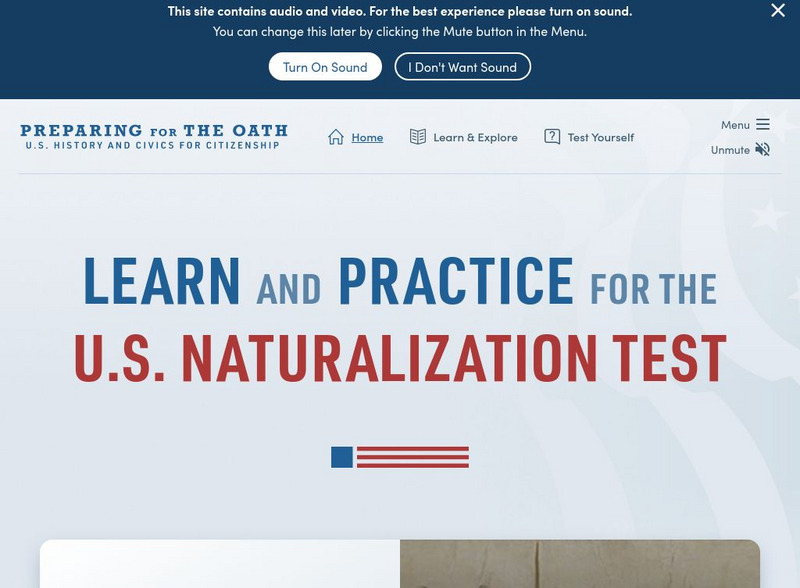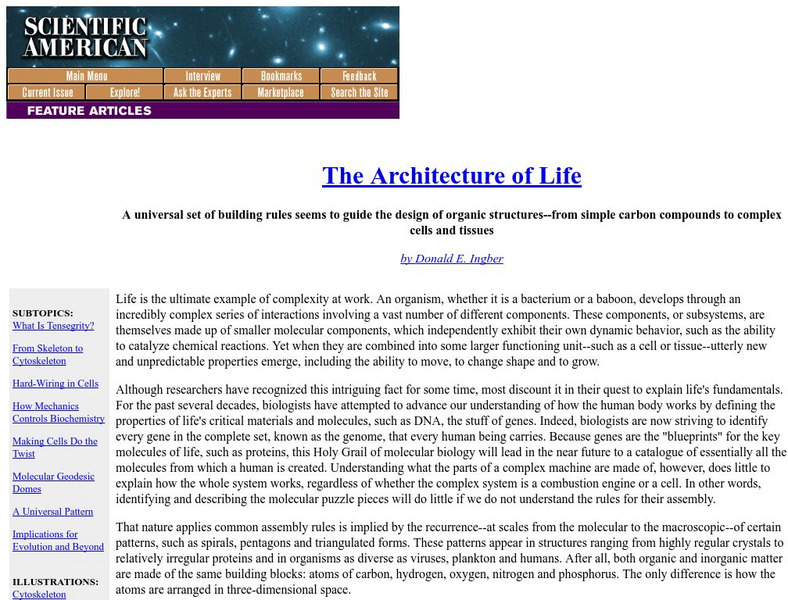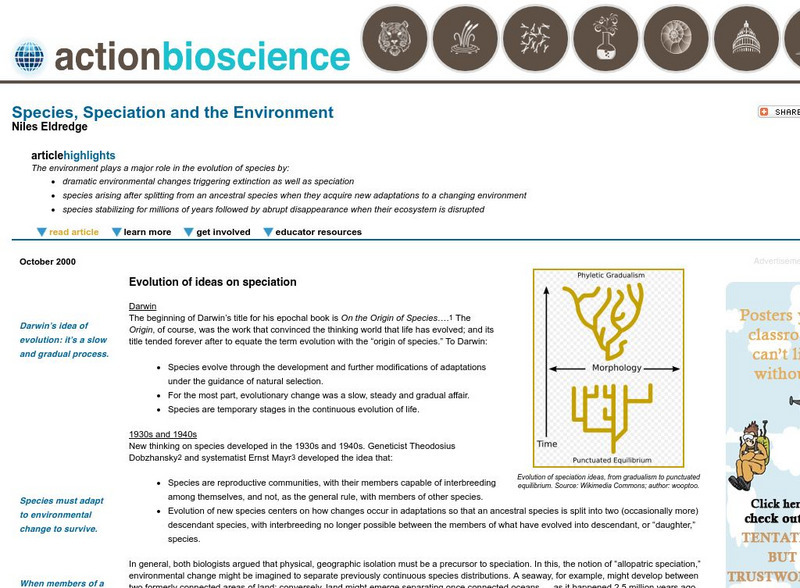Hi, what do you want to do?
Curated OER
Government Lesson Plan: Lesson Plan 6
Students examine legislation on immigration policies. They discuss current immigration laws, read a handout, complete a chart, and answer discussion questions.
Curated OER
Construction Worker Book
Students examine simple tools that are used in everyday life. In this construction worker tools lesson, students decide which tools should be used to solve the construction worker's problems in a manner that demonstrates the Simple...
Curated OER
Testing Termites to Discover
Students design an experiment to discover how termites respond to their environment.
Curated OER
Tour + Workshop = DESIGN: Presenting Information
Students develop a business card to market them. In this developing a business card to market them lesson, students design a business card to represent them. Students create a logo or graphic design that is professional and...
Curated OER
Breaking News English: Designer Babies Row in Britain
In this English worksheet, students read "Designer Babies Row in Britain," and then respond to 47 fill in the blank, 7 short answer, 20 matching, and 8 true or false questions about the selection.
American Museum of Natural History
American Museum of Natural History: Water: H2 O = Life
This exhibition illuminates the concept of ecological balance and the challenge of managing the Earth's water supply. Its videos and images help explain just how important water is to sustaining life.
PBS
Pbs Teachers:mammals of Namib: Who's in Charge?
Identify mammals of the Namib Desert, categorize which are predators and which are prey and discuss the balance of nature in Namib.
Nature Research
Nature Education: Energy Economics in Ecosystems
This article discusses how plants and microorganisms, until recently, have mostly controlled how much carbon dioxide is released into an ecosystem, and explains how this process works. Humans' burning of fossil fuels has upset the...
PBS
Pbs Teachers: Rivers of Destiny
This site explains the importance of rivers in the natural balance of life on Earth, and describes what happens when people begin to tamper with rivers. This will also help students identify options for dealing with the outcomes of human...
Smithsonian Institution
National Museum of American History: Preparing for the Oath: u.s. History and Civics for Citizenship
This site from the National Museum of American History, part of the Smithsonian Institution, is a great site for citizens and those learning to become citizens alike. Review the fifteen themes that deal with U.S. history and civics,...
Other
World Justice Project: What Is the Rule of Law?
Derived from internationally accepted standards, the World Justice Project's definition of the rule of law is a system in which the following four universal principles are upheld by four universal principles. These four universal...
PBS
Pbs Teachers:denali: The Wolf and the Moose: Predator and Prey Relationships
Examine the predator/prey relationship between wolves and moose in Alaska's Denali National Park and discuss how the balance of nature works between these two animals.
Albright-Knox Art Gallery
Albright Knox Art Gallery: Natural Materials
Learners will learn that artists like David Nash use natural materials such as wood to create works of art that incorporate principles of design such as balance, repetition, rhythm, and unity. They will collect their own natural...
PBS
Pbs: Nature: Hawaii's Vulnerable Biodiversity
Because of Hawaii's isolation, endemic species evolved in their own unique way. With the arrival of foreigners and colonization, new species were introduced to the islands. The result being a crisis within the Hawaiian ecosystem,...
Brigham Young University
World War I Document Archive: On the Nature of War, by Helmut Moltke (The Elder)
The text of a letter from Count Helmuth von Moltke, Chief of the General Staff of the German army, in 1880, to Johann Kaspar Bluntschli, an international law expert. Moltke wrote the letter in response to examining a handbook on war...
University of California
Organic Structures:the Architecture of Life
Article discusses how objects in nature are held together through balanced forces. Scroll midway down to find info on microtubules and microfilaments. Links to excellent electron micrographs.
Smithsonian Institution
National Museum of Natural History: American Mammals: Long Tailed Shrew
The Long-tailed Shrew probably uses its long tail for balance when it is climbing among the rocks or boulders that are always present where it lives. It spends almost all its time underground, and was, until recently, thought to be...
Smithsonian Institution
National Museum of Natural History: American Mammals: Pacific Jumping Mouse
Pacific Jumping Mice are remarkably quick and unpredictable. They push off with both hind feet and land on both forefeet, apparently using the tail for balance--a Mouse who had lost its tail somersaulted trying to land. Learn more about...
University of Groningen
American History: Outlines: Human Nature, Government and Individual Rights
Overview discussion of the views held by Madison and Hamilton that people, in general, need to have written into the law certain checks and balances to guard against abuse of power, protect individual rights and encompass a pluralistic...
American Institute of Biological Sciences
Action Bioscience: Species, Speciation and the Environment
The American Institute of Biological Sciences offers this article by Niles Eldredge, evolutionary theorist and curator at the American Museum of Natural History. Eldredge begins with Darwin's theories and summarizes subsequent thought,...
ClassFlow
Class Flow: Rates of Change
[Free Registration/Login Required] This is part 4 of a 4 part series to include the nature of chemical reactions, reaction types, and balancing chemical equations.
Cornell University
Cornell University: Art, Design, and Visual Thinking
Use the left-hand toolbar of this site to investigate an online textbook for the language of design. It provides visual examples and explanations of line, form, color, color psychology, texture, balance, proportion and many more...
CPALMS
Florida State University Cpalms: Florida Students: Enlightenment Ideas and the Founding Fathers
A tutorial that looks at the ideas from the Enlightenment that influenced the Founding Fathers, particularly those of John Locke and Montesquieu. A PDF file of the tutorial is available.
PBS
Pbs Teachers: Predator Protector Game Lesson
Describe the habitat, food web and ecosystem of shark species. Identify threats to sharks and explore how top predators help to maintain the balance of nature within ecosystems. This lesson plan also contains an interactive game.




























